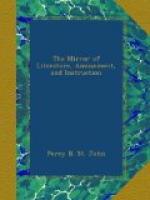I had the curiosity, soon after the first disturbance, to go to the house of the deceased, under the pretext of visiting the old lady who had so faithfully attended him in his last illness. She told me her friend had an unbounded affection for Antonelli; that he had, for some weeks previous to his death, talked only of her, and sometimes represented her as an angel, and then again as a devil. When his illness became serious, his only wish was to see her before his dissolution, probably in hopes of receiving from her some kind expression, or prevailing on her to give him some consoling; proof of her love and attachment. Her obstinate refusal caused him the greatest torments, and her last answer evidently hastened his end; for, added she, he made one violent effort, and raising his head, he cried out in despair, "No, it shall avail her nothing; she avoids me, but I’ll torment her, though the grave divide us!" And indeed the event proved that a man may perform his promise in spite of death itself.
Weekly Review.
* * * * *
UGGOLINO.
Modernized from the “Monk’s tale” In Chaucer.
(For the Mirror.)
Of Uggolino, Pisa’s hapless Count,
How shall my Muse the piteous tale relate!
Near to that city, on a gentle mount,
There stands a tow’r—within
its donjon grate
They lock’d him up, and, dreadful
to recount,
With him three tender babes to share his
fate!
But five years old the eldest of the three—
Oh! who could rob such babes of liberty!
Doom’d was the Count within that
tow’r to die,
Him Pisa’s vengeful bishop did oppose;
With covert speech and false aspersions
sly
He stirr’d the people, till they
madly rose,
And shut him in this prison strong and
high;
His former slaves are now his fiercest
foes.
Coarse was their food, and scantily supplied,
A prelude to the death these captives
died.
And on a luckless day it thus befell—
About their surly jailer’s wonted
hour
To bring them food, he enter’d not
their cell,
But bolted fast their prison’s outer
door.
This on the County’s heart rang
like a knell—
Hope was excluded from this grizzly tow’r.
Speechless he sat, despair forbade to
rave—
This hold was now their dungeon and their
grave.
His youngest babe had not seen summers
three;
“Father,” he cried, “why
does the man delay
To bring out food? how naughty he must
be;
I have not eat a morsel all this day.
Dear father, have you got some bread for
me?
Oh, if you have, do give it me, I pray;
I am so hungry that I cannot sleep—
I’ll kiss you, father—do
not, do not weep.”




